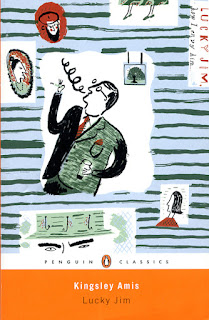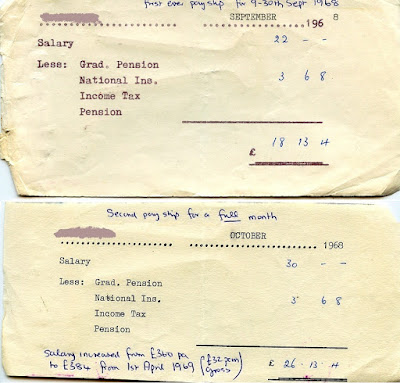Kingsley Amis: Lucky Jim (1954) (4*)
Malcolm Bradbury: Eating People is Wrong (1959) (2*)
I used to enjoy campus novels – stories about university life – immensely.
As a mature student, I soaked up the BBC’s 1981 adaptation of Malcolm Bradbury’s The History Man with Anthony Sher as Howard Kirk, gripped by the unconstrained, free-thinking lifestyle it portrays, and wanted it for myself. Not until I read the actual novel many years later did I realise what an objectionably selfish snake the anti-hero is.
Later, having somehow pulled-off the unlikely trick of getting a job in a university, I was greatly entertained by David Lodge’s campus trilogy, Changing Places, Small World and Nice Work, written in the nineteen-seventies and nineteen-eighties. There was a lot in the wranglings between staff, pointless activities and scrabbling for advancement that rang true, as did the chaos lower down the academic hierarchy depicted in Tom Sharpe’s Wilt which I experienced first-hand on moving to a Polytechnic.
In recent weeks I have been catching up on two early campus novels from the nineteen-fifties: Kingsley Amis’s Lucky Jim and Malcolm Bradbury’s Eating People is Wrong. Both books are very much of the nineteen-fifties in the social attitudes they portray. I guess they helped frame the way we thought of provincial universities during the nineteen-sixties when I was at school, unsuccessfully applying through UCCA.
Lucky Jim (1954) was for me the most enjoyable of the two. It ages well and is often hilarious. As David Lodge points out in the introduction, the humour comes not only from Amis’s wonderful comic timing in the handling of situations, but also from his original, educated but classless writing style, which often makes use of original twists to everyday turns of phrase:
To look at, but not only to look at, they resembled some kind of variety act…
He’d found his professor standing, surprisingly enough, in front of the Recent Additions shelf in the College Library…
Consciousness was upon him before he could get out of the way.I found myself sympathising with the predicament of misfit young lecturer Jim Dixon, and felt very satisfied at the end when he walks off with the girl and everything else. However, many of the comic situations, for example when Dixon accidentally burns holes in his Head of Department’s bedsheets whilst staying at his house, and his subsequent attempts to conceal the damage, could be in any comic novel rather than one specifically set in a university. It could be from a Brian Rix Whitehall farce. I might well look out for more by Kingsley Amis.
Eating People is Wrong (1959) I found less than satisfactory. It concerns the prematurely old-fashioned Professor Treece and his difficulties in making sense of the changing post-war world of the nineteen-fifties. There are too many characters, none very likeable, most under-developed, too many switches of viewpoint from the thoughts, opinions and dilemmas of one to those of another and then to those of the author, and a tendency to tell rather than show – all the things that writing experts say you should avoid, but who are they to find fault with the acclaimed founder of the famous MA in Creative Writing course at the University of East Anglia? It is no real defence that these things appear to be conscious and deliberate.
I suppose the novel resembles university life where people fall into and out of each others’ lives without reaching any kind of resolution, to an incessant background buzz of brilliant yet pointless wordplay. Much of the dialogue would not be out of place in an Alan Ayckbourne play. Perhaps it tries too ostentatiously to be clever by trying to generate too many epigrammatic quotations, and twists and turns to accepted clichés:
With sociology one can do anything and call it work.
... it had always seemed to Louis that a fundamental desire to take postal courses was being sublimated by other people into sexual activity;
… if you are interested in [old] houses, you know what the world is like and it is not like you.
… soon it won’t be necessary to go to America. It will all be here.After nearly two hundred pages of nothing much happening, a subversive writer called Carey Willoughby arrives to give a talk and declares: “With my sort of book there’s no resolution, because there’s no solution. The problems aren’t answered in the end because there is no answer. They’re problems that are handed on to the reader …”
Was Bradbury referring to himself?
Having grasped all of this, scoring it two stars is mean. I’m sure I would get more out of it on slow second reading, but life’s too short.
Key to star ratings: 5*** wonderful and hope to read again, 5* wonderful, 4* enjoyed it a lot and would recommend, 3* enjoyable/interesting, 2* didn't enjoy, 1* gave up.




